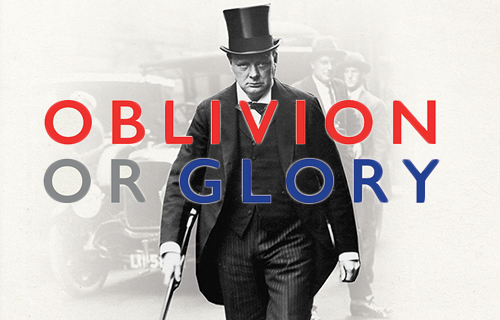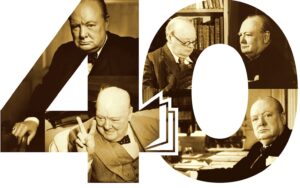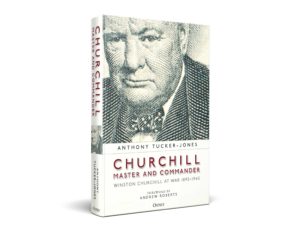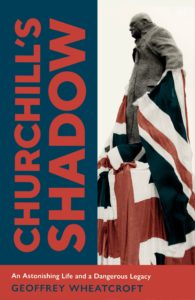Bulletin #162 — Dec 2021
Oblivion or Glory

November 28, 2021
Q&A with David Stafford
David Stafford has previously written two books about Winston Churchill and his use of intelligence information while serving as prime minister. In his latest book, Stafford looks at what he regards as the pivotal year in Churchill’s career, 1921, when he made decisions about Ireland and the Middle East that would affect people’s lives throughout the century that has followed but was also a year when Churchill’s personal life was deeply affected. The Churchill Bulletin recently interviewed Prof. Stafford on this topic.
CB: 2021 is the 100th anniversary of 1921, the pivotal year for Churchill you write about in your book Oblivion or Glory. How did you come to identify this year as the focus of your book?
DS: Churchill the man as much as the politician has always fascinated me. From this perspective the year 1921 was pivotal in his life, marked both by financial good fortune and great personal loss. The year began with an unexpected inheritance—itself the result of a tragedy—and this, combined with lucrative contracts for The World Crisis, his multi-volume history of the First World War, gave him much needed financial independence. It also opened the door to his purchase of Chartwell, the base from which he was to operate for the rest of his life. 1921 also saw the first public exhibition of his paintings and set him firmly on his career as a gifted amateur artist.
Yet it also witnessed significant tragedy and grief. His highly supportive mother, as well as and his beloved baby daughter Marigold, died suddenly and unexpectedly. So did Sir Ernest Cassel, the one time banker to King Edward VII, a close friend of Churchill’s father, and one of his strongest financial and political backers. His brother-in-law committed suicide in Paris. The death of Sir George Ritchie at the end of the year also delivered a blow. Ritchie had found for Churchill his parliamentary seat in Dundee in 1908 and since then, as chairman of the local Liberal Party, had served as his loyal political prop in the city. By any measure, these were major milestones. Family and friends were important to Churchill, and he relied heavily upon them. Two of his often neglected cousins play important roles in the events of 1921. One was Clare Sheridan, a successful sculptress, whose pro-Bolshevik enthusiasms shocked him when she traipsed off to Moscow to sculpt the heads of Lenin, Trotsky, and other top Bolsheviks. The other was Freddie Guest, a Liberal backroom fixer who helped oil his often rocky relations with the prime minister, David Lloyd George.
On the political front, the year also marked a turning point. He successfully chaired the Cairo Conference that settled troublesome postwar issues in the Middle East and was widely regarded as a triumph. Likewise, his role in negotiating the peace treaty with Sinn Fein in Ireland that brought an end to the Anglo-Irish war brought him considerable praise as a peacemaker.
CB: Death is a motif in your book in relation to Churchill (Marigold, Sir George Ritchie, Lord Herbert Lionel Vane-Tempest)—how does the specter of death influence Churchill’s decision-making?
DS: The death of parents, children, friends, is an inevitable and tragic part of any person’s life. Churchill reacted to these losses with great resilience. He had just turned 46 years old, and had finally surpassed the life span of his father Lord Randolph Churchill, whose life and career he had lovingly chronicled in a biography. Churchill had often wondered if he, too, would die young, so this year was a significant milestone. He could now contemplate at least another twenty years of active life, while at the same time being acutely aware of his own mortality. I think the combination of these factors combined to make Churchill more considered and focused on his personal and political future, and generally less impetuous in his approach to life. This shift is symbolized by his increasing attraction to sitting contentedly in front of a canvas for hours painting a landscape rather than hurtling around on horseback playing polo.
CB: 1921 is also the 100th anniversary of the creation of Northern Ireland as well as the Irish Republic. What were Churchill’s views of this situation?
DS: It’s dangerously easy to assume that Churchill’s attitude to Ireland can be summed up by his support for the Black and Tans, the auxiliary British police force responsible for often violent and brutal actions against the Irish Republican Army. In reality, his views on Ireland were complex. It’s often forgotten that his family had close links with Ireland and that he respected Irish nationalist feeling. What he strongly opposed was IRA violence. Throughout 1921 he urged the need for a truce and supported negotiations with Sinn Fein. He played a significant role in the eventual signing of the peace treaty, established a respectful relationship with the IRA’s firebrand Michael Collins, and by the end of the year was supervising details of the handover of power in Dublin. One of his major concerns about Ireland was the effect that the conflict was having on Anglo-American relations. 1921 was to see some of his most fervent and articulate expressions of his belief in an Anglo-American future.
CB: What is the public perception of Churchill entering 1921 and how does it change over the course of the year?
DS: When 1921 opened, the shadow of the Dardanelles failure hung heavily over his reputation. Along with his often bellicose language denouncing Lenin’s dictatorial Bolshevik regime in Russia, it marked him down publicly as a dangerous and impulsive war maker. “Winston has a reputation as a buccaneer,” reported Sir William Sutherland, Lloyd George’s political “fixer,” shortly before the year began. “The country regards hims as a bold, bad man.” Yet by the end of the year Churchill was being heralded as a peacemaker as well as the only man in the Cabinet with a sane and comprehensive view of world politics. Some Conservatives, who had long considered him as a traitor to the party for his defection to the Liberals two decades before, were also starting to see him as a possible future leader of their party. He had obviously emerged from the dark days of his eclipse and was clearly now a prime minister in the making. Glory, not oblivion, was to be his future.
Subscribe
WANT MORE?
Get the Churchill Bulletin delivered to your inbox once a month.






